选修6Unit1_Art语法(If及wish引导的虚拟语气)
- 格式:ppt
- 大小:6.77 MB
- 文档页数:10
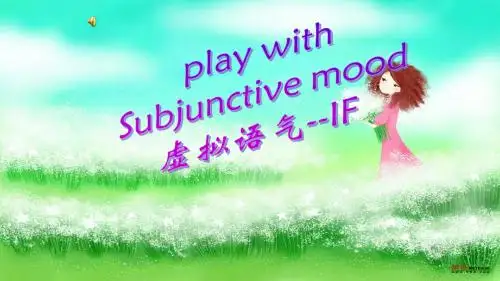
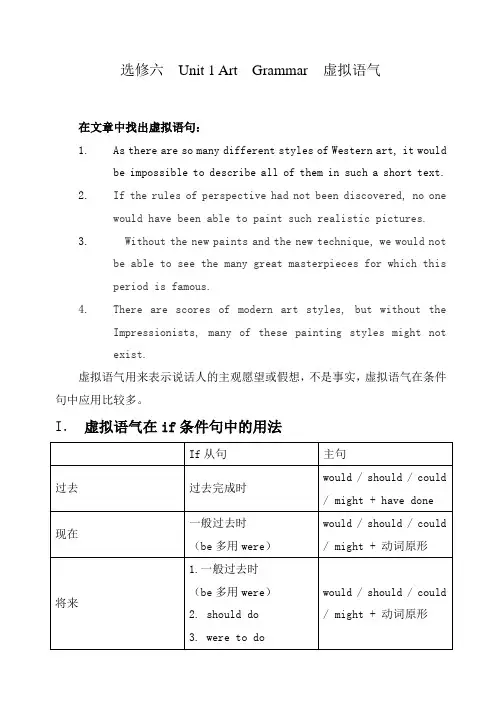
选修六Unit 1 Art Grammar 虚拟语气在文章中找出虚拟语句:1.As there are so many different styles of Western art, it wouldbe impossible to describe all of them in such a short text.2.If the rules of perspective had not been discovered, no onewould have been able to paint such realistic pictures.3.Without the new paints and the new technique, we would notbe able to see the many great masterpieces for which thisperiod is famous.4.There are scores of modern art styles, but without theImpressionists, many of these painting styles might notexist.虚拟语气用来表示说话人的主观愿望或假想,不是事实,虚拟语气在条件句中应用比较多。
I.虚拟语气在if条件句中的用法If I were you, I would not let out the secret.若是我是你的话,我可不能泄露那个秘密的。
If I knew his new address, I would tell you.若是我明白他的新地址,我会告知你的。
If he studied harder, he would pass the exam.若是他学习再尽力点的话,他会通过考试的。
If we had made fuller preparation, we should have won the game.若是咱们做了更充分的预备的话,咱们确信就赢了这场竞赛。
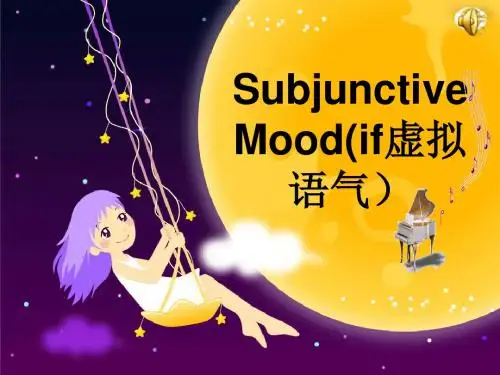
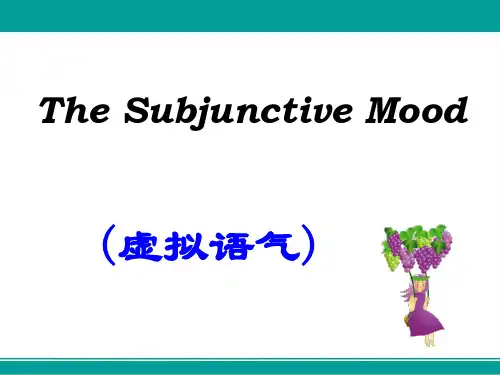
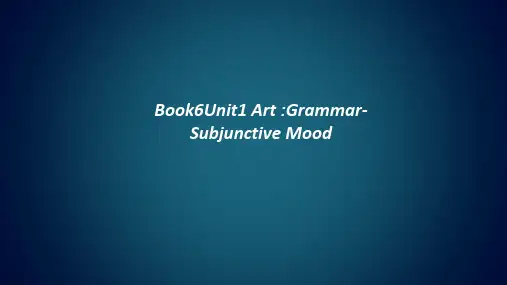
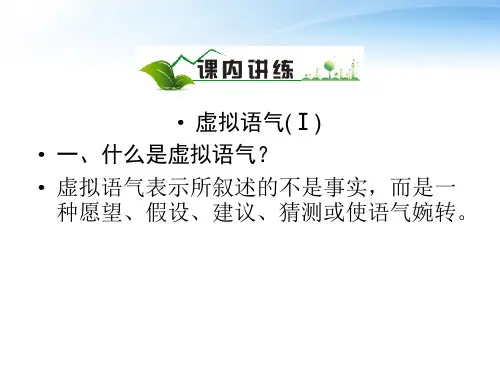
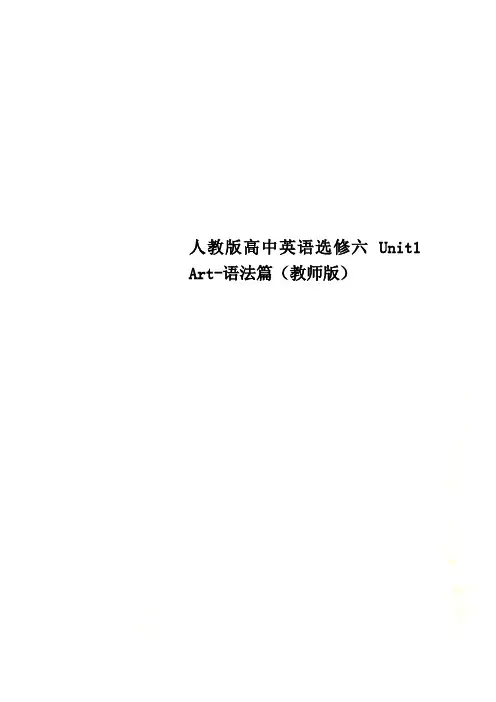
人教版高中英语选修六 Unit1 Art-语法篇(教师版)Unit1 Art-语法篇_____________________________________________ __________________________________________________________________________________ _____________________________________1.掌握本课语法虚拟语气的用法,并理解其含义;2.能够利用虚拟语气的知识作对相应练习题,学会灵活使用。
虚拟语气的用法虚拟语气表示一种假设的情况,或一种主观的愿望,即动词所表示的动作或状态并非事实,或不可能实现。
英语虚拟语气的形式有下列几种:一、虚拟语气用于条件状语从句注意:主句中的should通常用于第一人称,would 可用于任何人称,同时也可根据意思用情态动词could, might等代替should, would。
1.与现在事实相反条件从句结果从句连接词2.3.错综时间虚拟语气当条件状语从句表示的行为和主句表示的行为所发生的时间不一致时,动词的形式要根据它所表示的时间来调整。
例如:If I were you, I would have gone home.(从句说的是现在,主句指的是过去。
)If you had followed the doctor's advice, you would be quite all right now.(从句说的是过去,主句指的是现在。
)If the weather had been more favorable, the crops would be growing still better.其它状语从句1.方式状语as if(as though)如果从句表示与现在事实相反,谓语动词用一般过去时;表示与过去事实相反,谓语动词用"had+过去分词";表示与将来事实相反;谓语动词用"would(might, could)+动词原形"。

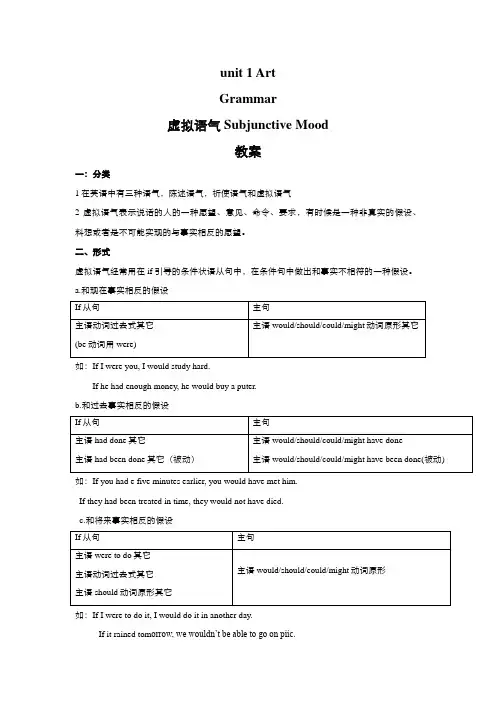
unit 1 ArtGrammar虚拟语气Subjunctive Mood教案一:分类1在英语中有三种语气,陈述语气,祈使语气和虚拟语气2 虚拟语气表示说话的人的一种愿望、意见、命令、要求,有时候是一种非真实的假设、料想或者是不可能实现的与事实相反的愿望。
二、形式虚拟语气经常用在if引导的条件状语从句中,在条件句中做出和事实不相符的一种假设。
a.和现在事实相反的假设如:If I were you, I would study hard.If he had enough money, he would buy a puter.b.和过去事实相反的假设如:If you had e five minutes earlier, you would have met him.If they had been treated in time, they would not have died.c.和将来事实相反的假设如:If I were to do it, I would do it in another day.If it rained tom orrow, we wouldn’t be able to go on piic.d.混合条件句混合条件句是指条件句是对过去事实相反的假设,而主句则表示现在的某种情况。
三、注意事项①如果从句中有were、had或者should时,则可以省略if,并将were、had或者should提前至句首,构成部分倒装,但如果是否定句,则否定词not不提前。
如:Were I to be young again, I would study medicine.=If I were to be young again, I would study medicine.Had you not left so early, you might have missed the train.=If you had not left so early, you might have missed the train.②用介词短语代替条件状语从句,常用的介词有with, without, but for.如:Without your help, we couldn’t have finished the work ahead of time.=But for your help, we couldn’t have finished the work ahead of time.=If it had not been for your help, we couldn’t have finished the work ahead of time.=Had it not been for your help, we couldn’t have finished the work ahead of time.③在句中出现了表示转折的连词,如or, or else, otherwise等,如果句意和事实不符也要用虚拟语气。
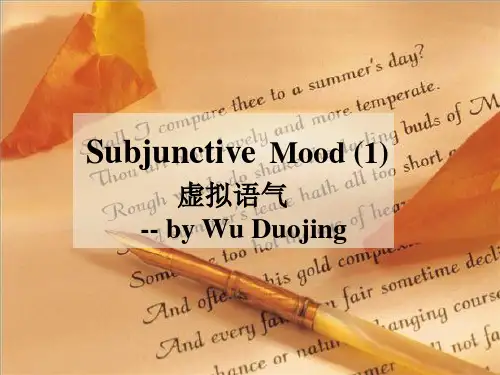
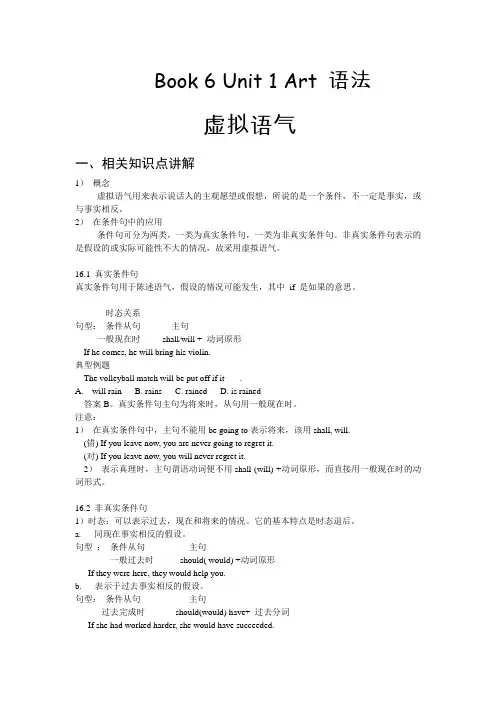
Book 6 Unit 1 Art语法虚拟语气一、相关知识点讲解1)概念虚拟语气用来表示说话人的主观愿望或假想,所说的是一个条件,不一定是事实,或与事实相反。
2)在条件句中的应用条件句可分为两类,一类为真实条件句,一类为非真实条件句。
非真实条件句表示的是假设的或实际可能性不大的情况,故采用虚拟语气。
16.1 真实条件句真实条件句用于陈述语气,假设的情况可能发生,其中if 是如果的意思。
时态关系句型:条件从句主句一般现在时shall/will + 动词原形If he comes, he will bring his violin.典型例题The volleyball match will be put off if it ___.A.will rainB. rainsC. rainedD. is rained答案B。
真实条件句主句为将来时,从句用一般现在时。
注意:1)在真实条件句中,主句不能用be going to表示将来,该用shall, will.(错) If you leave now, you are never going to regret it.(对) If you leave now, you will never regret it.2)表示真理时,主句谓语动词便不用shall (will) +动词原形,而直接用一般现在时的动词形式。
16.2 非真实条件句1)时态:可以表示过去,现在和将来的情况。
它的基本特点是时态退后。
a.同现在事实相反的假设。
句型:条件从句主句一般过去时should( would) +动词原形If they were here, they would help you.b.表示于过去事实相反的假设。
句型:条件从句主句过去完成时should(would) have+ 过去分词If she had worked harder, she would have succeeded.The rice would not have been burnt if you had been more careful.If my lawyer had been here last Saturday, he would have prevented me from going.If he had come yesterday, I should / would have told him about it.含义:He did not come yesterday, so I did not tell him about it.If he had not been ill and missed many classes, he would have made greater progress.含义:He was ill and missed many lessons, so he did not make greater progress.c.表示对将来的假想句型:条件从句主句一般过去时should+ 动词原形were+ 不定式would + 动词原形should+ 动词原形If you succeeded, everything would be all right.If you should succeed, everything would be all right.If you were to succeed, everything would be all right.16.3 混合条件句主句与从句的动作发生在不同的时间,这时主,从句谓语动词的虚拟语气形式因时间不同而不同,这叫做混合条件句。
Teaching Design—Unit 1 Art (Reading)Time Duration: 40 minStudents: Class 10, senior 2Teaching Objectives1.Students to master the usage of the Subjective mood and use it in different situation correctly.2.Students are able to use expressions such as, I wish ... were / did ...If ... were / did ..., ... would / could / should / might do ...Teaching Key and Difficult Points1.How to enable the students to know the structure and the usage of the Subjective mood.2.How to help students use the subjunctive mood correctly.Teaching MethodsTask-based Language Teaching Approach, and situational approach.Teaching AidsThe multi-media, chocks,and blackboard.Teaching ProceduresStep 1 Lead-inShow students the definition of the subjective mood.英语动词有三种语气,陈述语气,祈使语气和虚拟语气。
一、陈述语气(The Indicative Mood):用来陈述一个事实,或提出一种看法,有肯定、否定、疑问或感叹等形式。
遵义清华中学导学案年级:高二学科:英语执笔:汪娟课题:Subjunctive Mood in “if clause”if条件句中的虚拟语气一、学习目标:1. Command Subjunctive Mood in “if clause”2. Master the inversion form of If-clauses of subjunctive mood where “if” is left out二、预习指导:1、重点:掌握if引导的真实条件句与if引导的虚拟条件句的区别。
(1). if真实条件句表示条件是_______________, 采用___________语气。
E.g.①If we ______ (have) chances, we shall have further cooperation.②----What will you do if it________(rain) tomorrow?-------I will sleep at home if it ________ (rain) tomorrow.(2). if虚拟条件句表示条件是_______________, 采用___________语气。
与现在事实相反:If I were a bird, I could fly in the sky.与过去事实相反:If she hadn’t called me,I would have overslept this morning.与将来事实相反:If Present Xi came to our school this weekend, we would be veryhappy.2、难点:if虚拟条件句的时态变化规律。
(一)、请圈出句中的谓语动词并观察并思考1. 总结一下:这些句子中的if条件句是与什么时间相反?2. 猜一猜:if条件句和主句中的时态变化有什么规律?①If I had one million dollars, I would travel around the world. ②If we had time now, we should read it once more.③If he knew the secret, he might tell you.Conclusion 1: 表示与_________事实相反的情况(二)、请圈出句中的谓语动词并观察并思考1. 总结一下:这些句子中的if条件句是与什么时间相反?2. 猜一猜:if条件句和主句中的时态变化有什么规律?①If it were to rain tomorrow, the football match might be put off.②If I met Obama some day, I would shake hands with him.③If I should go to the moon one day ,I could take a lot of pictures of it .Conclusion 2: 表示与__________事实相反的情况▲提炼一下:通过以上的学习,你认为在虚拟语气中谓语动词变化规律是什么?__________________________________(三)、请圈出句中的谓语动词并观察并思考1. 总结一下:句子中的if条件句是与什么时间相反?2. 猜一猜:if条件句和主句中的时态变化有什么规律?If she hadn’t called me, I would have overslept this morning.Conclusion 3: 表示与__________事实相反的情况(四)、Summarize the rules of the Verb Forms Of If-clause :present→______________past →______________future →____________(五) 省略if的虚拟条件句使用部分倒装语序如果在条件句中含有were、had或should,可将if省略,然后将were,had或should移至主语之前。
高中英语语法讲解:虚拟语气一、概述:1.虚拟语气用来表示一个说法并非真实情况,而是说话人的想象假设或主观建议。
2.与虚拟语气相对应的是陈述语气,表示该说法是真实的,符合现实的,用于陈述句、疑问句、感叹句等。
3.虚拟语气的构成有两种:(1) (should) do(2) 时态倒退与现在事实相反:一般现在时do→一般过去时did;be动词(am/is/are) 都变were与将来事实相反:一般将来时will do→过去将来时would do与过去事实相反:一般过去时did→过去完成时had done二、使用虚拟语气的11种情况1.表示“建议、命令、要求、坚持”的词+ should 虚拟语气, 表示“应该做某事”,should 可省略。
常见此类单词有:suggest/suggestion, advise/advice, recommend/recommendation, propose/proposal, order/command/demand, urge, require/request, insist等。
He made a suggestion that TV series (should) not take up too much of students' time.It was demanded that a doctor (should) be called in immediately to save the general's life.注:(1) suggest意为“暗示、表明”(2) insist意为“坚持说、坚持认为”时,后加陈述语气,表示真实情况。
What he said suggested that he wasn’t in favor of watching too much TV.She insisted that she was (be) right and (should) not be punished (not punish).2.在句型It's important/vital/necessary/essential/natural/a pity/shame/strange/... that...中用should虚拟语气,表示“应该/竟然做事某”,should一般不省。